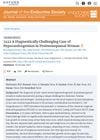 44 citations,
March 2004 in “Journal of Investigative Dermatology”
44 citations,
March 2004 in “Journal of Investigative Dermatology” The effects of estrogen on human hair growth are unclear and need more research.
 5 citations,
July 1994 in “PubMed”
5 citations,
July 1994 in “PubMed” Finasteride, when taken daily, lowers dihydrotestosterone levels but doesn't noticeably affect adrenal steroid production, except by blocking the 5 alpha-reductase enzyme.
 October 2024 in “Journal of the Endocrine Society”
October 2024 in “Journal of the Endocrine Society” The case highlights the complexity of diagnosing high testosterone in older women and the need for thorough testing.
 September 2024 in “Medicine theory and practice”
September 2024 in “Medicine theory and practice” A young girl's hyperandrogenism was caused by an adrenocortical adenoma, diagnosed and treated through detailed evaluations.
 9 citations,
February 2019 in “Journal of Clinical Research in Pediatric Endocrinology”
9 citations,
February 2019 in “Journal of Clinical Research in Pediatric Endocrinology” Children with classic congenital adrenal hyperplasia have thicker heart fat and are at higher risk for heart problems and early atherosclerosis.
 29 citations,
February 2004 in “Experimental and Clinical Endocrinology & Diabetes”
29 citations,
February 2004 in “Experimental and Clinical Endocrinology & Diabetes” Men with early balding often have hormone levels similar to women with polycystic ovary syndrome.
6 citations,
January 1984 in “PubMed” Spironolactone treatment reduced hair growth and androgen levels in hirsute women, but the overall effectiveness was just adequate.
 May 2021 in “Journal of the Endocrine Society”
May 2021 in “Journal of the Endocrine Society” A woman's hair loss and other symptoms were due to a rare hormone deficiency treatable with steroids.
 32 citations,
December 1999 in “Journal of Investigative Dermatology Symposium Proceedings”
32 citations,
December 1999 in “Journal of Investigative Dermatology Symposium Proceedings” 17-β-Estradiol applied to the skin stops hair growth, while ICI 182 780 helps hair grow in mice.
 216 citations,
November 1999 in “Fertility and Sterility”
216 citations,
November 1999 in “Fertility and Sterility” Testing basal 17-HP levels is a good way to screen for nonclassic adrenal hyperplasia in women with high androgen levels.
 19 citations,
August 1999 in “European journal of endocrinology”
19 citations,
August 1999 in “European journal of endocrinology” The study concluded that testing hormone levels after stimulation is not reliable for identifying carriers of 21-hydroxylase deficiency; genetic testing is necessary.
 31 citations,
February 1997 in “The Journal of Clinical Endocrinology and Metabolism”
31 citations,
February 1997 in “The Journal of Clinical Endocrinology and Metabolism” People who carry the 21-Hydroxylase Deficiency gene are not more likely to have excessive male hormone levels.
37 citations,
May 2018 in “Transgender health” Oral estradiol works for many transgender women but needs personalized dosing and monitoring.
 232 citations,
June 1975 in “Journal of Steroid Biochemistry”
232 citations,
June 1975 in “Journal of Steroid Biochemistry” Cyproterone acetate is effective for acne but less so for hirsutism and alopecia, with some side effects and quick menstrual cycle recovery after treatment.

The document's conclusion cannot be provided because the document is not available or cannot be read.
 February 2025 in “PubMed”
February 2025 in “PubMed” TrichoSol™ effectively stabilizes various hair treatment ingredients for different durations.
 December 2024 in “Journal of Clinical Research in Pediatric Endocrinology”
December 2024 in “Journal of Clinical Research in Pediatric Endocrinology” 21-hydroxylase deficiency causes hormone imbalances leading to various symptoms, and diagnosis involves clinical and genetic tests.
 February 2020 in “Open Access Macedonian Journal of Medical Sciences”
February 2020 in “Open Access Macedonian Journal of Medical Sciences” The patient with severe hirsutism improved after being diagnosed with non-classic congenital adrenal hyperplasia and treated with corticosteroids.
 January 2017 in “Clinical & medical biochemistry”
January 2017 in “Clinical & medical biochemistry” Certain gene variations in AKT2 are more common in women with PCOS and are linked to higher levels of specific hormones and symptoms.
January 2024 in “International journal of molecular sciences” A brain-made hormone can protect against memory-related brain damage caused by harmful proteins.
 4 citations,
May 2013 in “Actas Dermo-Sifiliográficas”
4 citations,
May 2013 in “Actas Dermo-Sifiliográficas” Most Spanish Caucasian women have a widow's peak, and their hormone levels suggest they process certain hormones faster.
9 citations,
July 1993 in “The journal of investigative dermatology/Journal of investigative dermatology” Sex hormones and antiandrogens can either stimulate or inhibit human hair follicle cell growth depending on the dose.
 2 citations,
April 2013 in “Expert Review of Endocrinology & Metabolism”
2 citations,
April 2013 in “Expert Review of Endocrinology & Metabolism” Identifying nonclassic congenital adrenal hyperplasia and carriers of CYP21 mutations is challenging, and genetic counseling is recommended due to their prevalence.
1 citations,
January 2023 in “Journal of Clinical Medicine” Minoxidil can cause a skin reaction called ALEP.
 1 citations,
March 2022 in “Clinical and Experimental Obstetrics & Gynecology”
1 citations,
March 2022 in “Clinical and Experimental Obstetrics & Gynecology” Ovarian volume is significantly related to higher levels of certain hormones in Korean women with PCOS.
 July 2023 in “Journal of Clinical Medicine”
July 2023 in “Journal of Clinical Medicine” Choosing the right starting dose of Clomiphene Citrate for ovulation induction in PCOS women is challenging; higher BMI and hormone levels may indicate resistance to the standard dose.
 13 citations,
January 2012 in “International Journal of Trichology”
13 citations,
January 2012 in “International Journal of Trichology” Most hirsutism patients had idiopathic hirsutism or PCOS, with hormonal imbalances and signs like acne and irregular periods.
9 citations,
April 2016 in “Clinical Endocrinology” Scalp hair 17-OHP and androstenedione levels can help monitor treatment in CAH patients.
January 2006 in “Xibei zhiwu xuebao” Norethindrone and levonorgestrel can enhance or inhibit root growth in Arabidopsis thaliana depending on the concentration.
A new lipid-based formula using myristyl myristate can improve estradiol treatment for hair loss.






















